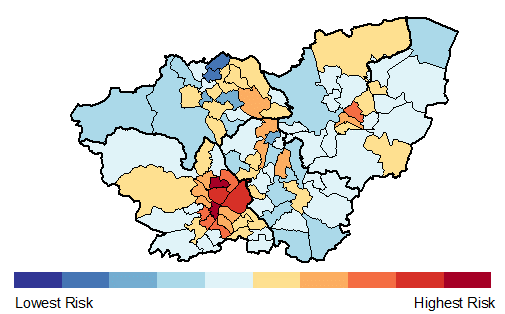In this case study, we hear from Dr. Rowland Seymour (Mathematics), who has been making use of help from the BEAR software group to enable his research into safeguarding women.

I’m an Assistant Professor in Mathematics and my research involves developing statistical tools to map and measure crimes, such as human trafficking and violence against women and girls.
Digital research is a valuable tool when designing surveys as it gives you the power to go beyond standard techniques. Well-designed online survey tools make the process of providing data much easier for respondents, as well as reduce cleaning and preparation time for researchers.
I used a BEAR hosted website to run a survey I had designed to map the risk of Female Genital Mutilation (FGM) in South Yorkshire. FGM is a violent procedure where the female genitals are deliberately cut, injured or changed, but there is no medical reason for this to be done. It is a crime in the UK and people can face a prison sentence for arranging or carrying out FGM.
The findings in our study have been really well received and we managed to secure follow on funding to get our research into the hands of the people who can use it.
There are many local services in South Yorkshire working towards ending this crime, but no one service has a complete picture of where FGM is happening. This makes it difficult for services to design local interventions to safeguard those at risk of abuse. BEAR hosted a comparative judgment study I designed to map FGM at the ward level. Safeguarding professionals in the county were shown pairs of wards and asked to say which ward had the higher risk of FGM. From all these comparisons, I was able to estimate the relative risk level in each ward.

The BEAR software group were incredibly helpful in making sure the online survey tool was accessible and suitable for use. I didn’t have any experience with hosting services before, so BEAR were able to make the website fully accessible and comply with legal and cookie policies from the University.
The findings from our study have been really well received and we managed to secure follow on funding to get our research into the hands of the people who can use it. I have already met with MPs to discuss this work and they have used my research to raise questions in Parliament about how the Government is tackling FGM (e.g. on official data and on interventions).
We were so pleased to hear of how Rowland is able to make use of what is on offer from Advanced Research Computing, particularly to hear of how he has made use of BEAR hosting research websites – if you have any examples of how it has helped your research then do get in contact with us at bearinfo@contacts.bham.ac.uk. We are always looking for good examples of use of High Performance Computing to nominate for HPC Wire Awards – see our recent winners for more details.
